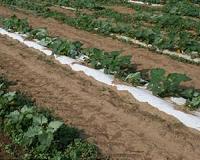 |
Budapest, Hungary (SPX) Jan 04, 2011 Apricots are important to Turkey, the country where more apricot crops are grown and exported than anywhere in the world. Looking to unlock the mystery of apricots' origins and increase crop production, scientists are studying the genetic relationship between apricot varieties. New research from a team of Hungarian and Turkish scientists has confirmed the genetic link between Turkish and Hungarian apricot cultivars, yielding information that provides valuable data for apricot growers and breeders. It is widely believed that apricots originated in China, arriving in Europe through central Asia and Asia Minor. Apricot cultivars are classified into four major eco-geographical groups: central Asian, Irano-Caucasian, European, and Dzhungar-Zailing. The central Asian and Irano-Caucasian (including Turkish cultivars) groups show the richest diversity, while the European group-including cultivars grown in North America, Australia, and South Africa-is thought to be the least diverse. Apricots from eastern European cultivars have clearly distinguished characteristics from other cultivars of European origin. Although many studies have been done on Turkish apricots, there remains uncertainty about the self-incompatibility genotypes for many Turkish cultivars. A team of researchers from the Corvinus University of Budapest and Ataturk University and the Malatya Fruit Research Institute in Turkey published a study in the Journal of the American Society for Horticultural Science that confirms an evolutionary theory. "Microsatellite analyses have suggested that Hungarian and European apricot cultivars might have originated through hybridization among Irano-Caucasian genotypes", said corresponding author Julia Halasz. This assumption seems to be confirmed by historical and linguistic evidence; during the Ottoman occupation of Hungary numerous records documented the introduction of Turkish graft-wood and other propagation materials to Hungary. The researchers used polymerase chain reaction (PCR) amplification to determine the S-genotypes of a set of Turkish apricot cultivars, and extended the method to identify self-compatible apricot cultivars. "We determined the complete S-genotype of 51 cultivars and the partial S-genotype of four cultivars. A total of 32 different S-genotypes were assigned to the 51 cultivars, and many of them (28) were classified into newly established cross-incompatibility groups", Halasz noted. Another 12 cultivars demonstrated unique incompatible genotypes and seven self-compatible cultivars were identified in the examined accessions. "The fact that Turkish and Hungarian apricot cultivars carry twelve and five S-alleles, respectively, and all five alleles detected in Hungarian cultivars were also present in Turkish apricots furnished molecular evidence supporting the long-suspected historical connection between Hungarian and Turkish apricots", said Halasz. The research confirms that Turkish germplasm contributed considerably to the development of several desirable Hungarian apricot cultivars." Halasz added that the connection between the two gene pools appeared to be relatively recent, associated with historical events dating back 300 years. This study is the first to examine S-genotype diversity of apricots native to Turkey. The scientists anticipate that the research findings will be used by producers to make correct selections of pollination partners in new orchard plantings, as well as by researchers interested in the evolutionary history of apricots.
Share This Article With Planet Earth
Related Links American Society for Horticultural Science Farming Today - Suppliers and Technology
 Paper Mulches Evaluated For Commercial Vegetable Production
Paper Mulches Evaluated For Commercial Vegetable ProductionLexington KY (SPX) Jan 04, 2011 Polyethylene mulches, used widely in commercial vegetable production to improve crop yields and produce quality, have distinct disadvantages. Disposal options are limited, and plastic mulches often end up in landfills, being burned, or disposed of illegally. Recycling polyethylene mulches is also a challenge; the mulches used in large-scale vegetable production are contaminated with too mu ... read more |
|
| The content herein, unless otherwise known to be public domain, are Copyright 1995-2010 - SpaceDaily. AFP and UPI Wire Stories are copyright Agence France-Presse and United Press International. ESA Portal Reports are copyright European Space Agency. All NASA sourced material is public domain. Additional copyrights may apply in whole or part to other bona fide parties. Advertising does not imply endorsement,agreement or approval of any opinions, statements or information provided by SpaceDaily on any Web page published or hosted by SpaceDaily. Privacy Statement |